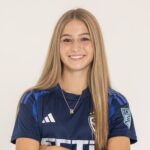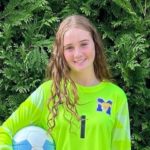Arsenal’s Karbassiyoon shares his story with young audiences across Va.
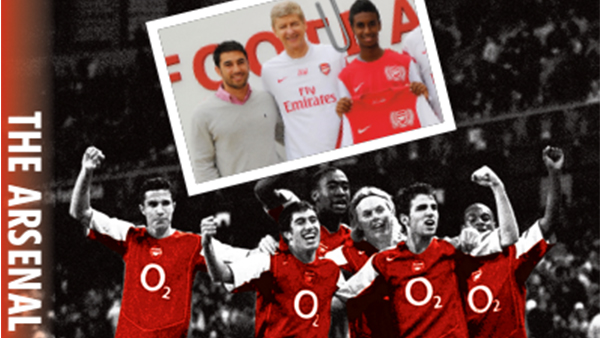
ALEXANDRIA, Va. – Danny Karbassiyoon lived out one of modern U.S. soccer’s true fairy tales when he shot out of youth soccer obscurity in quiet Roanoke, Virginia to earn a professional contract with English powerhouse Arsenal FC in 2003.
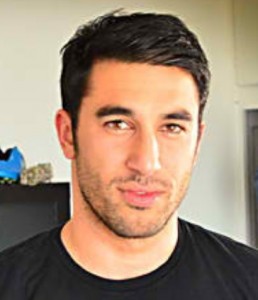 Though injury brought his against-the-odds adventure to a premature halt four years later, he quickly transitioned into a scouting role with the tradition-rich club, where he identified and helped sign young prospects Gedion Zelalem and Joel Campbell.
Though injury brought his against-the-odds adventure to a premature halt four years later, he quickly transitioned into a scouting role with the tradition-rich club, where he identified and helped sign young prospects Gedion Zelalem and Joel Campbell.
Karbassiyoon remains the first and only American to score for the Gunners, and his unique experiences eventually inspired him to write a book, “The Arsenal Yankee,” which was released in the United States this spring. This month he’s crisscrossed his home state to visit youth clubs – including his childhood club, Roanoke Star – for Q&A events to promote and discuss the book.
+READ: Olney Rangers U-15s star Gedion Zelalem signs contract with London giants Arsenal FC
Earlier this week Karbassiyoon was hosted by the Alexandria Soccer Association, where he chatted about his journey with SiriusXM soccer personality Jason Davis and took questions from many of the Arsenal fans, youth players, parents and coaches on hand before signing books and posing for photos. It was a warm reception for a man who earned his “cult hero” status the hard way.
What can today’s soccer kids learn from Karbassiyoon, who came up in a slightly different soccer landscape than the one they face today? Plenty, it seems.
Growing up in the small southwestern Virginia town of Roanoke, he had limited access to the resources and big clubs that players in larger metropolises have. So he worked endlessly on his own, and weathered painful setbacks, like being cut from Virginia’s ODP state team. In fact, he nearly did not attend the ESP scouting camp where Arsenal scouts first spotted him, having been wait-listed and only offered a spot mere days before thanks to another player dropping out.
 “I used to practice every single day, basically in my backyard after school, usually from 3 to 5 [pm],” he explained. “And then we had club training for another two hours.
“I used to practice every single day, basically in my backyard after school, usually from 3 to 5 [pm],” he explained. “And then we had club training for another two hours.
“You’re limited a little bit as to what you can improve when you’re just training on your own. So the stuff I used to do on my own was all technical-based: We had a brick wall in our backyard and I would just pound the ball against it, work on my first touch, work on turning, dribble through a bunch of cones.”
When Arsenal saw enough of Karbassiyoon to offer him a two-week trial when he was 17, he was first thrown in with the club’s cutthroat reserve squad because he was a bit too old to join their U-18 academy side.
Though he had to fight through a harsh learning curve and bouts of homesickness, soon enough, he was called up to join the first team’s training sessions. It was one of the most demanding practice environments on the planet, the proving ground for the mighty “Invincibles,” the iconic squad that went undefeated for an entire English Premier League season. But those hours in the backyard helped him survive.
“Suddenly when Sol Campbell is on your back, shoving you when the ball is coming in to you, it becomes very different,” he said. “That said, when the ball does come to you, everything that you’ve done for years and years and years in the backyard does help you.
“What I did on my own every day helped one facet of my game, and it helped me technically feel very comfortable with anything that was thrown at me… I had the mentality that, ‘there’s no way this kid’s been practicing five days a week, two hours a day in his own backyard, and I have. So I’m better than him.’ That’s how you mentally start to feel about yourself. The club stuff, the structured stuff, helps with tactics – and you only learn so much playing on your own. You need other people around you, pressuring you to deal with spatial awareness and everything.”
“Players will come [to Arsenal] from Africa and South America who’ve never played structured soccer,” he added, “and they’re phenomenally technical players, incredible on the ball, but they just can’t do it in a team setting. They don’t understand how they fit into a team setting and what they need to do. You need the balance.”
+READ: Arsenal Soccer Schools to launch year-round program in U.S.
Karbassiyoon, whose father hails from Iran, was fortunate to have an Italian passport by virtue of his mother’s heritage, providing European Union status that allowed him to bypass the United Kingdom’s stringent work visa regulations. (He regretfully noted that one of the first questions he asks about prospective recruits is whether they have an EU passport, because it’s nearly impossible to import a player from the U.S. without one.)
But that wasn’t the only gift his parents provided him.
“They were always and continue to be very, very supportive in everything I do. They never pressured me, they were never the parents telling me to go outside and practice,” Danny told his audience in Alexandria.
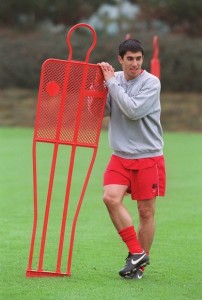 “I do remember my dad saying, ‘Danny, if you want to make a career in this game, there’s kids all over the world your age, younger than you, older than you, practicing right now, playing every single day. There are some that don’t even go to school, some that don’t know where their next meal is comign from, and this is all that matters to them. This is who you’re playing against, this is who you’re competing with. This is not just the Roanoke Star, not just the Virginia state team, not just Region I. It’s everybody in the world.’ “I took that to heart.”
“I do remember my dad saying, ‘Danny, if you want to make a career in this game, there’s kids all over the world your age, younger than you, older than you, practicing right now, playing every single day. There are some that don’t even go to school, some that don’t know where their next meal is comign from, and this is all that matters to them. This is who you’re playing against, this is who you’re competing with. This is not just the Roanoke Star, not just the Virginia state team, not just Region I. It’s everybody in the world.’ “I took that to heart.”
Kabassiyoon’s unique perspective on the American youth system also holds lessons for coaches and others concerned with player development.
“Technical level is the most important thing,” he said when asked what he looks for when evaluating players. “A scout’s biggest nightmare is seeing a player in a region, seeing that he’s very, very good in his region, bringing him over [to Arsenal] and seeing that he’s nowhere close to the level technically over there.
“The play will break down on the player if he’s not technically good enough. If he’s unable to deal with the speed of play, being able to play one-touch, retain possession when he’s under pressure, move the ball, bring others into play, then it breaks down. It’s very obvious.”
He also noted top European clubs’ full-blooded commitment to pushing their top prospects regardless of age grouping, citing the example of his former teammate Cesc Fabregas. The Spanish international made his Arsenal debut at the tender age of 16.
+READ: Playing up: Is developing their skills worth giving up our win?
“They always have this idea that if a player’s good enough, he’s old enough. So they’ll continue pushing him to the next level, to the next level, to the next level,” he said. “And I know personally, yeah, I got to play up a year with Roanoke Star, from the Under-16s to the Under-17s. But the Under-16 team was probably better than the Under-17s … There, you’re constantly getting pushed and I think you start to mature more as a player, which is huge.”
Karbassiyoon served as Arsenal’s chief scout for the CONCACAF region for nearly a decade. But during that time he identified only a small handful – less than half a dozen – of players he believed capable of keeping pace in the Gunners’ pass-and-move system.
 “We’re a little bit behind the mark, unfortunately, when we bring a player [from the U.S.] – already they’re saying, ‘oh, he’s an American guy,’” he said. “He has so much more to prove, whereas if you bring a player from Spain or Germany. ‘OK, these are soccer countries where we know there’s a great level there.’ Which is unfortunate, but I think we’re starting to change that perception a little bit as we continue to develop our players here.
“We’re a little bit behind the mark, unfortunately, when we bring a player [from the U.S.] – already they’re saying, ‘oh, he’s an American guy,’” he said. “He has so much more to prove, whereas if you bring a player from Spain or Germany. ‘OK, these are soccer countries where we know there’s a great level there.’ Which is unfortunate, but I think we’re starting to change that perception a little bit as we continue to develop our players here.
“Another huge thing I learned was, the mentality of players, and just how they carry themselves,” he continued. “The guys that do make it at the top level know that every single week is a trial, every single game they’re fighting for their job. That’s one of the biggest things I look for now in a player … When the other team is winning 2-0: how does the player react to that situation? Do they have their head down? Or are they the guy that’s willing their team to get back and fight for everything? … Just being good enough doesn’t necessarily mean you’ll make it at a club like Arsenal.”
“The Arsenal Yankee” is on sale now in paperpack and via Amazon Kindle. Those who wish to learn more can also find serialized excerpts posted at Goal.com.





